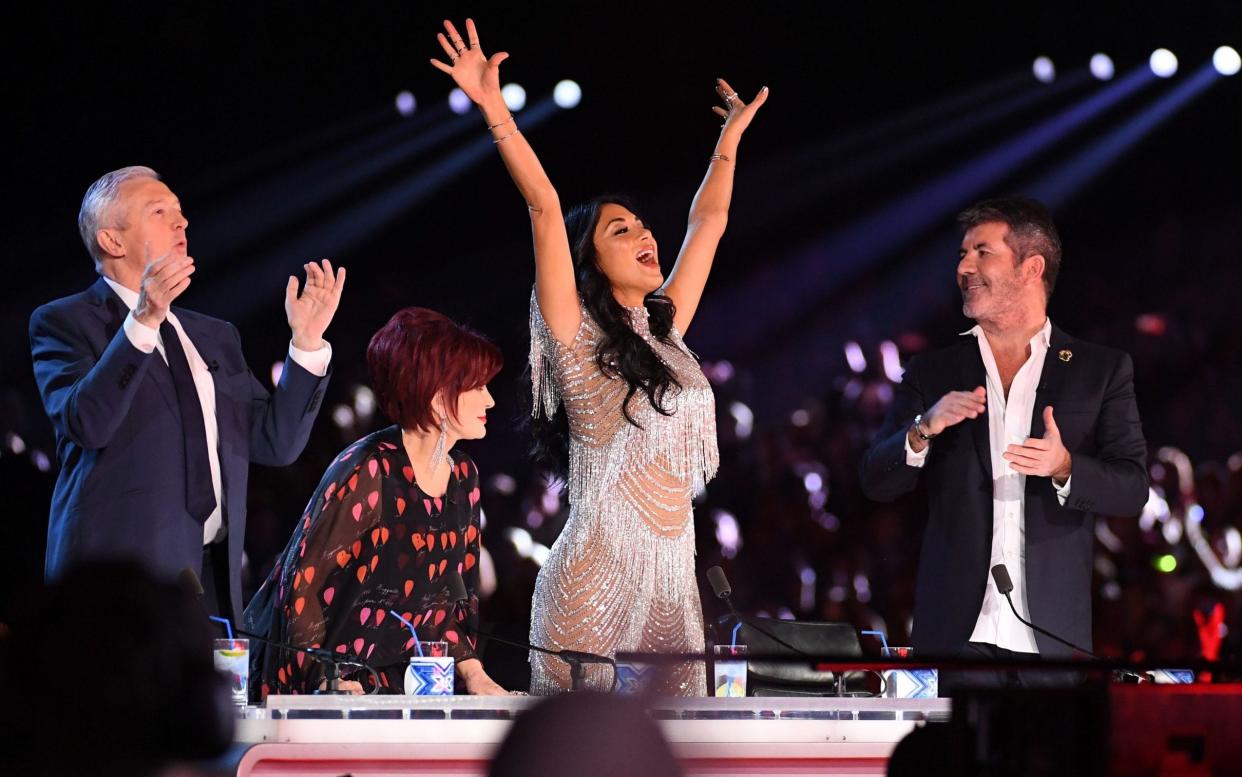Simon Cowell's dull, pointless changes have ruined The X Factor – but at least his sponsors are happy

I’ve been watching and writing about The X Factor for 14 years. I interviewed Steve Brookstein for Heat magazine back in 2004 before the show ruined his life (he seemed quite nice); I was on first name terms with Jedward in 2009 (I briefly even knew which one was which); and I’ve even met Chico (I hate to break it to you but his trademark fur coat smelled a bit musty).
When the show started, I was young enough to comfortably enter the girls category (well, if I could sing) and I used to head out on the town after writing about it on a Saturday night; now I’d very much be an over and I have to chain-drink tea to keep me going through the 10pm finishes.
My dedication was seriously questioned in 2015 when the idiotic decision to replace Dermot O’Leary with Olly Murs and Caroline Flack ruined everything, alongside a terrible judging panel, involving Nick Grimshaw and Rita Ora, who cared far too much about being cool – and X Factor has never been about being cool.
That gross error in judgment is when most of the country stopped watching the show. Viewing figures peaked at the 2010 final, with almost 20 million people tuning in to see Matt Cardle beat Rebecca Ferguson and One Direction. This year, when Rak-Su beat Grace Davies and Kevin Davy White, only around a quarter of that amount bothered to watch it.
And I don’t know a single one of them. Watching X Factor every weekend used to feel like a party – a party involving the sharpest minds on Twitter saying lots of witty things about the show, which they watched because they enjoyed it, in spite of knowing it was a calculated money-making machine, and my phone would buzz all night with messages from friends who were tuned in too.

None of these people watch it anymore. Trying to find funny comments to include in the Telegraph’s X Factor live blog every weekend has become quite the challenge when I used to be spoiled for choice.
The good news for this year’s winners Rak-Su – who are actually, in case you haven’t watched a single second of this series, pretty good – is that the four million or so people who do still bother with X Factor mostly watch it because they’re genuine fans who might actually buy their music. The teenyboppers were out in force on social media all weekend, and they loved every second of the final. You don’t need 20 million, or even five million, record sales (or downloads, or whatever…) to make it as a pop star – a few hundred thousand is enough to do very well indeed in the charts.
So there’s absolutely no reason why, with the right direction, this year’s best acts – Rak-Su, along with runners-up Grace Davies and Kevin Davy White – can’t do just as well outside the show as previous success stories like One Direction and Little Mix. It’s not a guarantee of success, of course – last year’s winner, Matt Terry, had the teenybopper factor going for him too, but his album has been a huge flop. However, remember that the same could be said for the acts who won during the show’s peak, like Matt Cardle. The fact is, it’s all down to who Simon Cowell is invested in, not viewers.

The X Factor is still doing what it’s always done: publicly manufacturing chart-ready pop acts, and that’s something Simon Cowell cares about far more than viewing figures. It was the show’s sponsors JustEat, not viewers, who he gave his heartfelt thanks to at last night’s grand finale – a comically grating TV moment, but not really a huge surprise. For Cowell and his fellow Syco big-wigs, the TV show itself is just a shortcut to building up fanbases and therefore revenue, and he's delighted that someone else is footing the bill for it.
The real hard work happens long after the victory confetti has been swept up, when the powers-that-be decide which acts they’re actually going to back - and their ranking in the phone vote doesn’t always have much to do with it.
This year’s biggest format change, in which all the power was supposedly given to the viewers, rather than the judges making the final call on which acts went through, is proof of that. The judges don’t really care who gets eliminated and who goes through; it’s all just for show.
X Factor winners and runners up - where are they now?
But still, those of us who now always stay in on Saturday nights ought to be able to demand more from our primetime entertainment. The other half-arsed format changes – the most bafflingly pointless being the all-new weekly “prize fight” between the most popular acts – have done nothing for the show. We want drama and suspense on Saturday nights, not the chance to see some wannabe whose name we’ve barely learnt win tickets to see Pink.
The show still has many positives going for it – Dermot O’Leary is a flawless presenter, the judges are generally fairly entertaining, and the aspiring singers still turn out in their thousands every year at the auditions – but the producers need to show a bit more love for viewers.
It was refreshing that the final two acts this year were songwriters as well as performers, but many viewers would have liked to have a novelty act on hand too to play the role of villain and offset all the worthiness. I never thought I’d miss Honey G, but she felt conspicuous by her absence this year. We need something to boo and laugh at, or the show’s in danger of turning into The Voice.
Rak-Su are the best X Factor winners we’ve had in years – a fun, likeable gang who got together all by themselves, rather than being plucked from auditions – which probably means that Simon Cowell regards this year’s series as a huge success. And perhaps it was… for him.
But millions of former viewers would say otherwise. Please, X Factor, all we ask is that you just remember how to entertain us; you used to do it so well.
